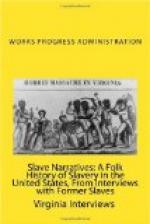“My mother’s mistress—I don’t remember her name—used to come and take Mary with her to market every day. The morning my mother ran away, her mistress decided she wouldn’t take Mary with her to market. Mamma was glad, because she had almost made up her mind to go, even without Mary.
“Mamma went down to the boat. A man on the boat told Mamma not to answer the door for anybody, until he gave her the signal. The man was a Quaker, one of those people who says ‘Thee’ and ‘Thou’. Mary kept on calling out the mistress’s name and Mamma couldn’t keep her still.
“When the boat docked, the man told Mamma he thought her master was about. He told Mamma to put a veil over her face, in case the master was coming. He told Mamma he would cut the master’s heart out and give it to her, before he would ever let her be taken.
“She left the boat before reaching Canada, somewhere on the Underground Railroad—Detroit, I think—and a woman who took her in said: ’Come in, my child, you’re safe now.’ Then Mama met my father in Windsor. I think they were taken to Canada free.
“I don’t remember anything about grandparents at all.
“Father was a cook.
“Mother’s mistress was always good and kind to her.
“When I was born, mother’s master said he was worth three hundred dollars more. I don’t know if he ever would have sold me.
“I think our home was on the plantation. We lived in a cabin and there must have been at least six or eight cabins.
“Uncle Simon, who boarded with me in later years, was a kind of overseer. Whenever he told his master the slaves did something wrong, the slaves were whipped, and Uncle Simon was whipped, too. I asked him why he should be whipped, he hadn’t done anything wrong. But Uncle Simon said he guessed he needed it anyway.
“I think there was a jail on the plantation, because Mamma said if the slaves weren’t in at a certain hour at night, the watchman would lock them up if he found them out after hours without a pass.
“Uncle Simon used to tell me slaves were not allowed to read and write. If you ever got caught reading or writing, the white folks would punish you. Uncle Simon said they were beaten with a leather strap cut into strips at the end.
“I think the colored folks had a church, because Mamma was always a Baptist. Only colored people went to the church.
“Mamma used to sing a song:
“Don’t you remember the promise
that you made,
To my old dying mother’s request?
That I never should be sold,
Not for silver or for gold.
While the sun rose from the East to the
West?
“And it hadn’t been a year,
The grass had not grown over her grave.
I was advertised for sale.
And I would have been in jail,
If I had not crossed the deep, dancing
waves.
“I’m upon the Northern banks
And beneath the Lion’s paw,
And he’ll growl if you come near
the shore.




